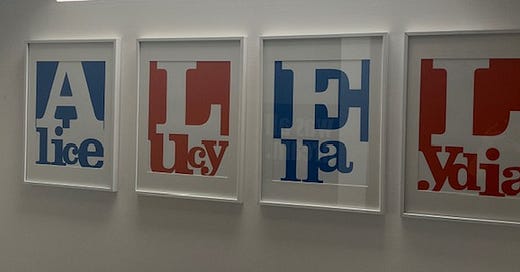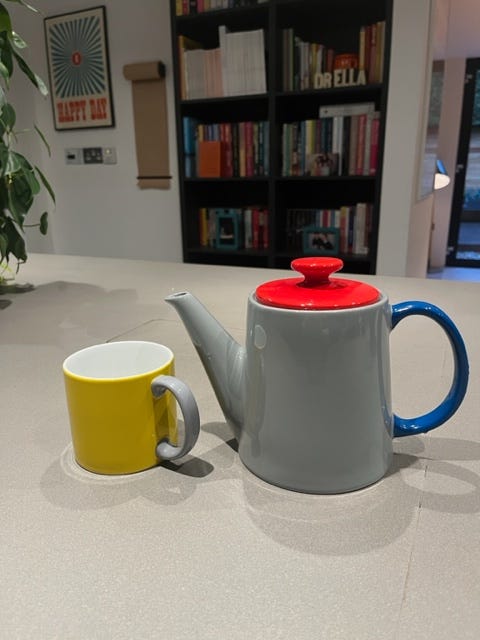“What’s his name?” he asked. I imagined he kept a notebook in his car, that he’d retrieve it from the glove compartment, write it down as soon as possible because ministers do those kinds of things. They have systems and processes, mnemonic strategies. Entire congregations depend on them, expect their care, and names can just be so easy to forget. It was a Tuesday. We were standing in the grounds of a church. It was pitch-black. I’d cursed the lack of lighting as I’d stumbled across the carpark towards what I thought might be my own vehicle. When I’d waved my keys randomly in the air, clicked on the unlock button, he had stepped out of the darkness. When he offered to pray for him, I was standing in the glare of my own headlights. We’d just left a Presbytery1 meeting. I had no right to be there, I didn’t fulfil the entry criteria but I’d started to feel a little like I belonged. I’d often threatened to write about it, that road to acceptance, to them knowing me by name. “We Have a Laugh at Presbytery” I’d call it2. Someone who knew me not only by name but through a long and shared history had told him my father-in-law was very ill. I was no longer his responsibility, he was no longer my minister when he offered up those prayers that night for a man he didn’t know. “His name’s Danny,” I said.
I’d been listening to Paul Simon’s Seven Psalms, 33 minutes of an 81-year-old ruminating on mortality, faith, the meaning of life, eternity. It was an acoustic monologue inspired by the Book of Psalms. “This whole piece is really an argument I’m having with myself about belief, or not,” said the man who no longer speaks to Art Garfunkel in the YouTube trailer3. “It could be a farewell,” said the critics. I preferred his midlife crisis. This seemed to be missing a melody. “The Lord is my engineer,” he chanted. It wasn’t exactly “roly-poly, little bat-faced girl”4. But I was more interested in why he’d created it, what conclusions he’d drawn. “What do songwriters do when they feel death approaching?” asked the New York Times. “As time runs out, some choose to spend it by determinedly creating music to outlive them,” they said. The idea for the album had come to him in a dream. He would wake between 3.30am and 5am, two to three nights a week and hear lyrics. It wasn’t clear if God was writing his album for him.
I was waking around the same time as Paul Simon every night except I wasn’t being given any meaningful lyrics, creating something to outlive me. I was looking for signs to help me make a decision. Should I go back? Could I go back? I wasn’t finding the Psalms helpful. I was ruminating on a series of anxieties it didn’t cover like dealing with octogenarians, teenagers, dogs, laundry, dinner ideas, and a phobia about going to church. “My stress levels are about twenty million percent,” I told my busy husband by text. “Do you think your anxiety is coming from the menopause?” he suggested. “A lot of it is coming from you,” I said.
Since the Friday afternoon when all I could do was make a cup of tea5, the rollercoaster of the unknown had continued. Each day brought a new development, a complication, the surgery, off then on, then off again, a clot, a trip to the big hospital to be assessed, a son’s business travel on then off, then on again. I’d weep when I thought of a wife and her 89-year-old sister making the train journey from Coleraine to Belfast to bring towels. There were six visitors round the bed on a Saturday afternoon. A woman had approached with an ice cream. “Can someone eat this?” she’d said. It was melting. She’d brought it for her mother. She was asleep. “I think she was more than asleep,” said my husband. My daughter ate it for another daughter. This made me weep too. The minister had been calling regularly. He’d left a cross. He'd told Danny to hold it in his hands if he felt anxious. Each person that came in to visit got a gift of the last person’s present – grapes, juice, biscuits. But the cross stayed. I wanted Paul Simon to go into a coronary care ward and have his argument there about belief.
There were ten Gillians in my iPhone. When I started to compose a WhatsApp message to the one who would come back to the church I’d left over two years ago with me, I realised I had access to a range of Gillians. Some had surnames to differentiate them, some were attached to the name of the child who knew my child. Gillian Piano had “let’s have a wee chat” in her bio. I’d collected a lot of people inside my phone. There were ten Karens too, nine Heathers. I had the numbers of almost thirty women who only had three names between them. But they weren’t just contacts in a mobile device. They were connections. We had history. I knew something about each of them. If I needed someone, there would always be a Gillian, Karen or Heather I could call.
When I went back to the church I left over two years ago and sat in a different place from before and had a view of the pulpit I’d never had before, I was early even though I’d always been late before. I wanted to watch everyone come in, somehow soak up their presence. “I know you and you and you,” I thought. “We have history. My life has touched yours and your life has touched mine”. I spotted Karens and Gillians and Heathers. “You looked completely at ease,” said the friend whose name was not Gillian, Karen or Heather who had not only messaged me before the service to say she’d sit with me but also afterwards to say how lovely it was to see me back. “Welcome home,” was the message on Facebook from someone who had a name beginning with O that no one else had nor could manage to spell. “You were behaving like a celebrity guest,” said my daughter. But, I was basking in the glow of feeling welcomed. I finally knew what church family was. Until no one ever asked me my name, I’d thought there was more to church than people who just knew my name, some massive mission or vision or grand shared commission. But it was much simpler than that. I realised I’d never known what belonging felt like until I had un-belonged.
There was a song on the radio. “Remember my name, remember my name”6, it said. Maybe it was a sign to go back to where they remembered my name.
“Heaven is beautiful. It’s almost like home. Children! Get ready. It’s time to come home,” says Paul Simon.
A body of church elders and ministers, especially (in Presbyterian churches) an administrative body (court) representing all the local congregations of a district.
Please do let me know if you’d like to read this?
You Can Call Me Al.
Last Friday Afternoon, All I Could Do Was Make A Cup Of Tea
I couldn’t find the teabags. I was in my own kitchen, opening cupboards like I’d never seen their contents before, like I didn’t make a pot there every single afternoon when boredom, apathy and an urge for sugar launch their three-pronged attack around 3pm. When I poured the boiling liquid into the cups, it was too weak and too watery. I was too shaky. …
Fame by Irene Cara.






Yes it was indeed lovely to see you back “home” Deborah. There’s no place like it!!